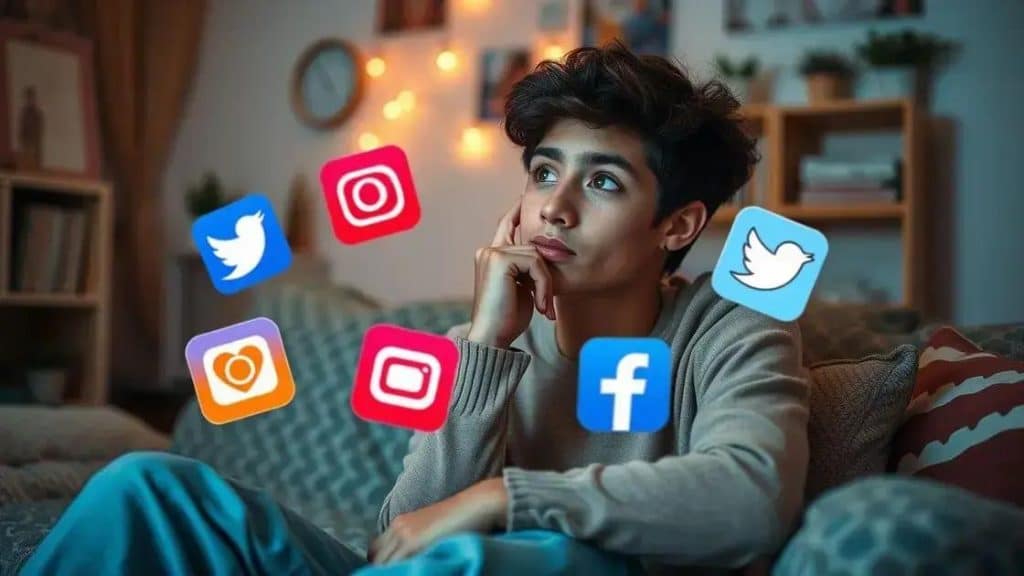Social media impact on youth mental health

Anúncios
The impact of social media on youth mental health includes both positive aspects, like fostering connections and self-expression, and negative effects, such as cyberbullying and comparison issues, highlighting the need for healthy usage strategies.
Social media impact on youth mental health is a topic of growing concern. With platforms dominating their daily lives, how does this affect their emotional wellbeing? Let’s dive into the nuances.
Anúncios
Understanding the connection between social media and mental health
Understanding the connection between social media and mental health is essential in today’s digital age. As young people spend more time online, it’s important to explore how these platforms affect their well-being and emotions.
Positive Aspects of Social Media
While there are risks, social media also offers benefits. It allows youth to connect with others, share experiences, and find support. Many find comfort in online friendships, especially when facing challenges.
Anúncios
- Building communities around shared interests.
- Access to mental health resources and support groups.
- Encouragement of self-expression through different platforms.
- Opportunities for learning new skills through social connections.
These positive facets help foster a sense of belonging and can motivate young users to engage with their peers.
Negative Effects of Social Media
However, it’s crucial to address the negative impact that can accompany social media use. Excessive use can lead to feelings of isolation, anxiety, and depression. Young people may compare themselves to unrealistic portrayals of others, fostering a damaging self-image.
Statistics show that higher time spent on social media correlates with increased rates of mental health issues. This can create a cycle where young individuals feel worse and retreat further into their digital lives.
Recognizing Signs of Distress
Parents and educators must be vigilant in recognizing signs of distress that may stem from social media interactions. Understanding these signs can help address problems early:
- Declining academic performance.
- Withdrawal from family and friends.
- Increased irritability or mood swings.
- Changes in sleep patterns.
By staying informed, adults can better support youth navigating the complexities of social media and its effects on their mental health.
As we continue to investigate the connection between social media and mental health, open conversations about these topics can lead to healthier online environments for young individuals.
Positive impacts of social media on youth

The positive impacts of social media on youth are often overlooked. These platforms can provide valuable connections and support in their lives. When used wisely, social media can enhance their overall development.
Fostering Connections
One of the primary benefits of social media is its ability to foster connections among young people. They can easily reach out to friends, family, and even strangers who share similar interests. This ability to connect helps to build relationships that may not be possible in traditional settings.
- Encouragement of friendships across distances.
- Access to diverse communities and cultures.
- Opportunities to collaborate on projects and ideas.
These connections can reduce feelings of loneliness and isolation.
Access to Information and Resources
Social media also serves as an excellent source of information. Youth can learn about various topics, from mental health to educational opportunities. With a few clicks, they can find resources that empower them and support their interests.
Many organizations use social media to share critical information on health, education, and advocacy, making it easy for young people to stay informed. When youth utilize these platforms effectively, they become aware of resources that can help them navigate challenges in their lives.
Encouraging Self-Expression
Another remarkable aspect of social media is its ability to encourage self-expression. Young individuals often share their thoughts, ideas, and creativity. This open sharing can lead to increased self-confidence and self-awareness.
- Platforms allow for creative outlets, such as art, photography, or writing.
- Sharing experiences fosters understanding and empathy among peers.
- Platforms provide spaces for activism and advocacy.
As youth express themselves, they learn to embrace their identities and find their voices.
In summary, the positive impacts of social media on youth are significant. With proper guidance, these platforms can be tools to enhance connections, access information, and encourage self-expression, benefiting young people’s mental health and overall growth.
Negative effects of social media interactions
The negative effects of social media interactions on youth are significant and cannot be ignored. As young people spend more time online, they may encounter various challenges that impact their mental health and overall well-being.
Cyberbullying and Harassment
One of the most pressing issues is cyberbullying. Unlike traditional bullying, cyberbullying can happen anytime and anywhere. Victims may feel trapped and helpless because the harassment follows them home through their devices.
- Incidents of harassment can lead to severe emotional distress.
- Many young people develop feelings of isolation and anxiety.
- In severe cases, cyberbullying can result in depression and suicidal thoughts.
Addressing this issue is crucial for creating a safer online environment.
Comparison and Self-Esteem Issues
Social media often creates a platform for unhealthy comparisons. Youth compare themselves to others by viewing curated images that depict a seemingly perfect life. These constant comparisons can negatively affect their self-esteem and body image.
When young people feel inadequate, it can lead to anxiety and chronic dissatisfaction with themselves. It’s essential to remind them that social media often highlights the best moments, not the whole picture.
Impact on Mental Health
Excessive use of social media can lead to various mental health issues. Studies show that spending too much time online correlates with anxiety, depression, and loneliness. Youth might feel more isolated despite being connected online.
- Increased screen time can disrupt sleep patterns.
- Less physical activity may lead to a sedentary lifestyle.
- Impacts on face-to-face social interactions can create a sense of disconnection.
Encouraging balanced use of social media is vital to promoting healthier habits. Engaging in offline activities helps combat these negative effects.
Overall, while social media interactions can have benefits, the negative effects need attention and understanding. By fostering open discussions about these issues, we can create a more supportive environment for young people.
Strategies for healthy social media usage

Adopting effective strategies for healthy social media usage is essential for young people to maintain their well-being. By implementing these strategies, they can enjoy the benefits of social media while minimizing its risks.
Set Time Limits
One effective strategy is to set time limits for social media use. By allocating specific times for online activities, youth can manage their time better and avoid excessive screen time. This helps them balance their online presence with offline interests and responsibilities.
- Using apps to track time spent on social media.
- Scheduling breaks to unplug from devices.
- Engaging in other activities such as sports or hobbies.
This promotes healthier habits and encourages active lifestyles.
Curate Your Feed
Another essential aspect is curating social media feeds. Youth should surround themselves with positive influences by following accounts that inspire and uplift them. Unfollowing or blocking toxic accounts that promote negativity can significantly enhance their online experience.
This selective engagement allows them to foster their interests and avoid harmful content. Consuming positive messages can bolster their confidence and mental health.
Practice Mindful Engagement
Mindfulness in social media usage helps young people reflect on how interactions make them feel. They should ask themselves if certain posts or comments bring them joy or negativity. Taking time to evaluate feelings associated with social media can aid in making informed choices about their online activity.
- Engaging in self-reflection after social media use.
- Expressing gratitude for positive connections.
- Reassessing friendships that negatively impact mental health.
By practicing mindfulness, they can build healthier habits that promote emotional resilience.
Ultimately, utilizing these strategies can empower youth to navigate the world of social media safely and responsibly. By establishing boundaries, curating content, and practicing mindfulness, they can enjoy the positive aspects of this platform while mitigating its risks.
FAQ – Frequently Asked Questions about Social Media Impact on Youth Mental Health
What are the positive effects of social media on youth?
Social media can foster connections, provide access to information, and encourage self-expression among young people.
What are the negative effects of social media interactions?
Negative effects include cyberbullying, comparison issues, and impact on mental health like anxiety and depression.
How can young people use social media healthily?
Strategies include setting time limits, curating their feed for positivity, and practicing mindfulness about their online interactions.
Why is it important for parents to talk about social media with their children?
Open conversations can help children navigate online challenges, ensuring they feel supported and understood while using social media.





